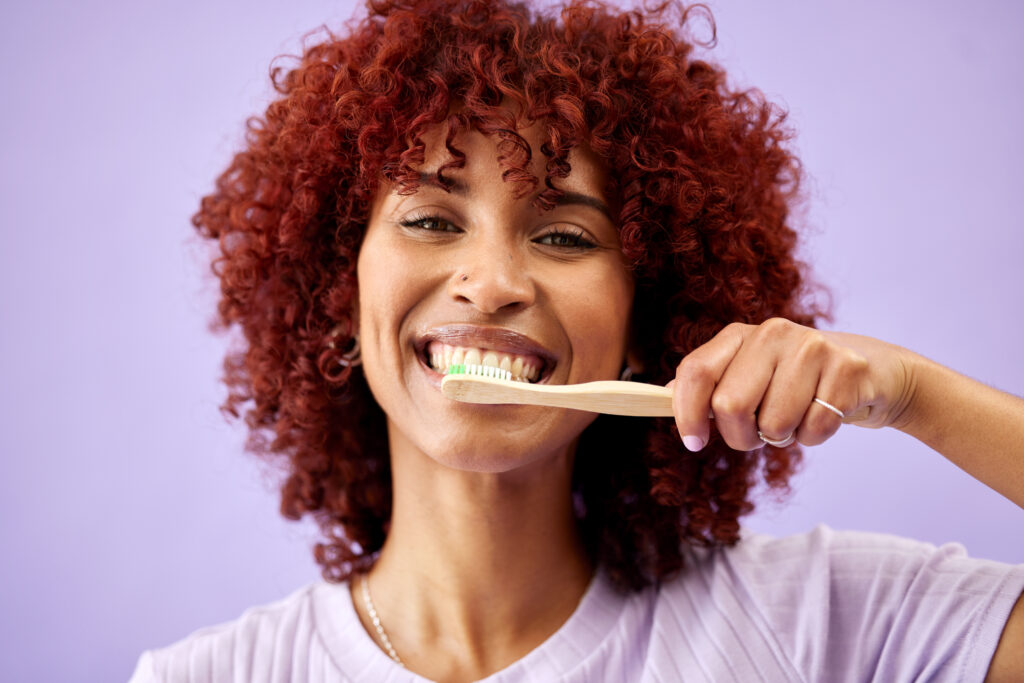In honour of National Brush (your Teeth) Day on November 1st, we are shining the spotlight on a different microbiome – your oral microbiome!
We talk a lot about the gut microbiome here at Chuckling Goat – the complex community of microorganisms, including viruses, bacteria, fungi and other microbes, that live in your gut. Did you know that your oral cavity (your mouth) is also home to its own microbiome? Your mouth is home to over 700 different species, most of which are harmless and even beneficial!1https://www.ncbi.nlm.nih.gov/pmc/articles/PMC6503789/#:~:text=The%20oral%20cavity%20has%20the,%2C%20fungi%2C%20viruses%20and%20protozoa.
It hopefully won’t come as a surprise to hear that your oral health can impact your gut health – and vice versa! While located separately, your oral and gut microbiomes are connected physically by your digestive tract, and microbially by the colonies of microorganisms within them2https://pubmed.ncbi.nlm.nih.gov/25623278/.
Emerging research suggests that microorganisms in your mouth may be swallowed and influence the composition of your gut microbiome. Many of these microorganisms are beneficial in aiding digestion. Interestingly, research shows us that poor dental health is associated with a higher risk of IBS/IBD.3https://pubmed.ncbi.nlm.nih.gov/25623278/ Poor oral health is associated with other chronic diseases too such as heart disease and diabetes!4https://www.cdc.gov/oralhealth/conditions/index.html
What does this mean?
Maintaining good oral hygiene is crucial to supporting the delicate ecosystem of bacteria in your body. Overgrowth of bad “pathogenic” bacteria can be harmful if they reach your gut microbiome and proliferate, forming a biofilm, which can affect your wider well-being.
Your mouth is the first line of defence for your stomach – so it’s important to keep the gatekeepers (your teeth) happy and healthy. Here are our top five tips for supporting your oral microbiome and wider wellbeing:
1. Maintain good oral hygiene:
- Brush your teeth regularly – ideally after each meal.
- Floss daily – to reach those food particles your toothbrush couldn’t reach.
- Regular dental check-ups.
2. Avoid regular use of antibacterial products
Avoid regular use of antibacterial products like toothpaste and mouthwashes (unless you have been advised to do so by your dentist or General Practitioner). Regular use can disrupt the natural balance of bacteria in your mouth.
3. Use mouthwash and toothpaste with rosemary
Instead of antibacterial products, use mouthwash and toothpaste with rosemary in it. Research suggests that rosemary can inhibit pathogenic microorganisms and biofilms from forming5https://pubmed.ncbi.nlm.nih.gov/28093936/. Read more about this incredible herb here.
4. Take Probiotics
Take probiotics like kefir and fermented foods! Probiotics can help replenish your oral microbiome and your gut microbiome with all the beneficial bacteria needed to thrive, like Lactobacillus, which can help prevent gum disease.6https://www.webmd.com/oral-health/probiotics-gum-disease.
Read more about fermented food here – What is fermented food, and how can it benefit you?
5. Chew your food
Not only will your stomach thank you, but chewing also stimulates saliva production, which naturally cleans and remineralises your teeth, which is particularly important after eating acidic or sweet foods.7https://www.tandaradental.com.au/are-you-paying-attention-to-how-you-eat-is-there-a-right-way-to-chew-your-food/
Did you know that chewing your food can often prevent bloating too? Read more here.
Curious to learn more about biofilm? Check out our article Biofilm – The Beauty and the Beast.
Questions? Feel free to contact us on live chat (weekdays from 8 am to 8 pm) to speak to one of our nutritional therapists.
References
- 1
- 2
- 3
- 4
- 5
- 6
- 7















